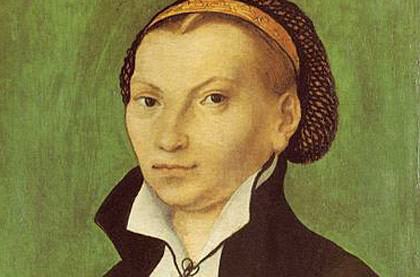“I am prepared to lose everything, even life or limb. May God stand by me.” So wrote Argula von Grumbach (1492–1563/68?) from Bavaria, who found Martin Luther’s message of Christian freedom and equality empowering. This noble woman challenged an entire Catholic university in Ingolstadt in defense of Lutheran faith and a student persecuted for “Lutheran heresy.” This best-selling lay author with her letter-treatises eventually disappeared under pressure from male authorities. Luther considered her a valiant hero of faith.
The Protestant principles “scripture alone,” “grace alone,” and “priesthood of all believers” inspired women just like men to reengage Christian faith and find renewed spiritual meaning in their daily vocations. With the newly written catechisms and hymns, women were equipped to teach the revived faith to their households, where they exercised significant leadership in matters of religious practice. Women lost the monastic option as convents were closed in Protestant areas, but they benefited significantly from the education provided even for peasant girls.
Whereas the Reformation theology proclaimed equality in Christian love and freedom from human-made bonds, women were forbidden to preach or teach in public. Motherhood was presented to women as the holiest of callings, on a par with that of apostles and bishops. So women used creativity in embracing their domestic calling and the authority it brought along.
Katharine Schütz Zell (1498–1562), a widely published lay author who had no children of her own, identified herself with a calling of a “church mother.” In this role she exercised pastoral authority by the side of her pastor-husband in Strasbourg, even daring to preach at funerals. Her scintillating writings in defense of marriage may have caused an uproar, yet her pastoral texts and a hymnbook demonstrate her desire to promote ecumenical unity and to empower Christians to sing the gospel with new voices. Like von Grumbach, she also corresponded with Luther.
Another associate of Luther was Duchess Elisabeth von Braunschweig (1485–1555), who used her authority as the “mother of the people in her land” to implement Lutheran faith through legislation. Like her own mother earlier, Elisabeth had suffered exile from her Catholic husband and children once she confessed her faith in public by receiving the sacrament in a Lutheran rite. Her advice to her son, whom she groomed as a Lutheran ruler, was that he should obey God, the emperor—and his mother.
Of all the Reformation mothers, the most famous is Luther’s beloved Katharina von Bora (1499–1552). She won the heart and admiration of Luther, who had orchestrated the escape of Katharina and eleven other nuns from their convent. As his equal “partner in calamity,” Katharina mothered their six children and managed the intricate finances and other affairs of their bustling household. Luther admitted that next to the Holy Spirit, he obeyed his wife-“lord,” Katharina.
These and other mothers of faith took significant risks and endured criticism if not even persecution for their choices. Their involvement was crucial for the new faith to take root.
This is one in a series of articles about Lutheranism on the 500th Anniversary of the Reformation. © 2016 Augsburg Fortress. Used by permission.


